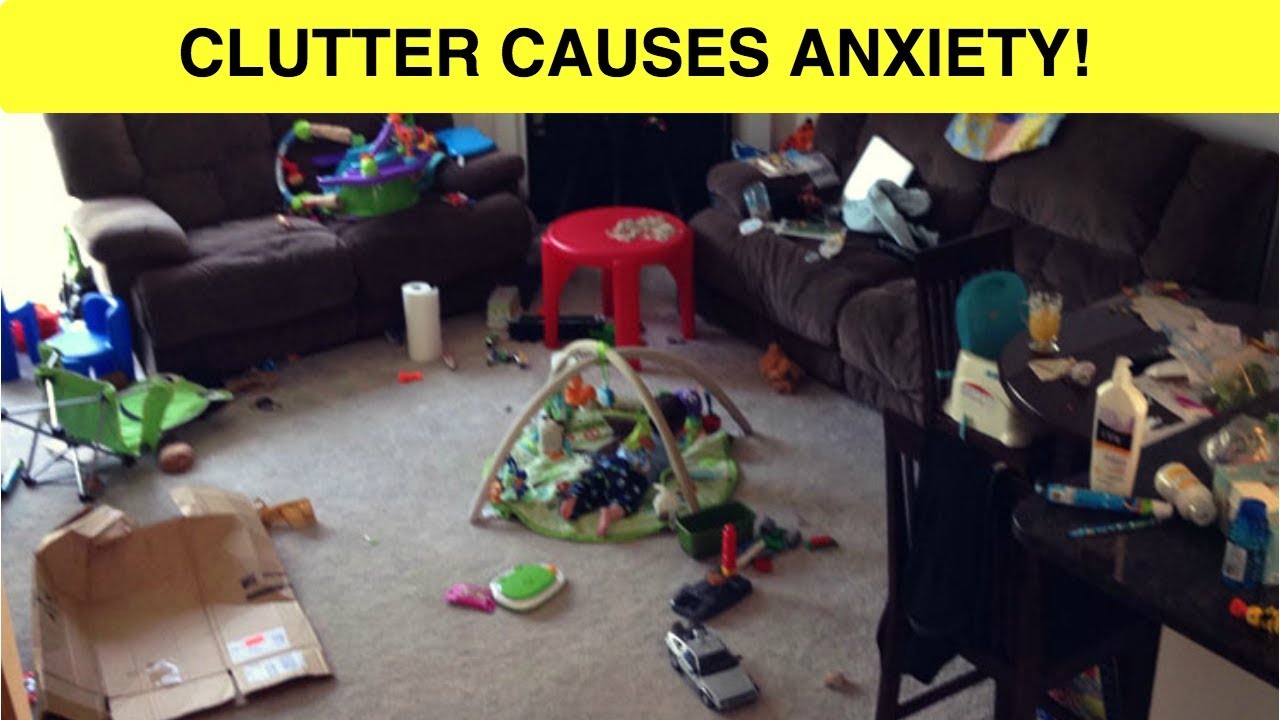Premium Only Content

There’s Scientific Evidence That Clutter Causes Anxiety
Did you know that scientific evidence proves that clutter causes anxiety? Clutter is defined as ‘a collection of things lying about in an untidy mass.’ While some people can work great in chaotic and messy environments, others need things to be precise and meticulous in order to function properly. But some research might suggest that the role clutter plays in our mental well-being is a lot more prominent than you might think. A study conducted by UCLA’s Center On Everyday Lives and Families showed that the relationship between clutter, anxiety, and stress is chemical. The study showed that women who live in cluttered homes have higher levels of the stress hormone cortisol than average.
Another study by Princeton University found that working in a physically cluttered environment negatively affects your ability to focus and process information, which leads to stress. On top of the scientific literature on the subject, psychologists also agree that clutter can be a great source of anxiety for some people.
#Clutter #Anxiety #Decluttering
Music:
https://www.youtube.com/audiolibrary/...
Summary:
- According to psychologist Sherrie Bourg Carter, who writes for Psychology Today, a messy home and/or work environment can lead to more stress and in some cases, the clutter itself can be ‘a significant source of stress and panic’ Sherrie says that there are 8 main components which contribute to clutter causing so much stress.
- The first is that clutter causes an abundance of stimuli from the external world whether it be through sight, sound, touch, smell or taste. Sherrier says that this causes ‘our senses to work overtime on stimuli that aren’t necessary or important.’
- Secondly, clutter takes away our attention because we are no longer focusing on our goals or task at hand and instead we need to take time to focus on the clutter.
- Thirdly, Sherrie says that clutter makes it hard for people to sit back and relax. Whether they have to physically clean the mess themselves or whether it be a mental taxation on the mind, clutter makes it hard for people to relax.
- And fourth, Sherrie says that clutter sends signals ‘to our brains that our work is never done.’
- Because of the clutter and the mess, clutter causes our brains to think that we are never finished when in reality, you could have been done all your work!
- Clutter can also cause anxiety in some people because they don’t know exactly where things are and they are unsure ‘what it’s going to take to get through to the bottom of the pile.’
- Sixth, clutter causes mixed emotions in some people. For those who need an organized and clean home or workspace, seeing clutter can cause feelings of guilt or embarrassment.
- Seventh, Sherrie says that open spaces (which are free from clutter) allow people to be both creative and productive. Thus, on the contrary, a lack of open space prevents creativity and productivity which Sherrie says is necessary for thinking, brainstorming, and problem-solving.
- And finally, clutter can cause feelings of frustration or even anger since we can get agitated when we can’t find what we need amidst the mess and clutter.
- But have no fear, Sherrie doesn’t just offer the symptoms of anxiety with clutter, she also comes forth with suggestions to declutter and also de-stress.
- Sherrie said: ‘tackle de-cluttering as a family. If clutter has invaded your entire house, don’t tackle the job alone. Get the whole family involved by starting with a room everyone uses and making each person responsible for a section.
- If you’re on your own, start with one area at a time and finish de-cluttering that area before moving on to another. This will give you a sense of accomplishment as you see your successes little by little.’
-
 11:06
11:06
Bestie
2 years ago12 Ways To Increase Your Testosterone Levels Naturally
8011 -
 2:17:02
2:17:02
Tundra Tactical
12 hours ago $5.11 earnedTundra Nation Live : Shawn Of S2 Armament Joins The Boys
36.7K5 -
 LIVE
LIVE
tacetmort3m
1 day ago🔴 LIVE - SOLO RANK GRINDING CONTINUES - MARVEL RIVALS
3,311 watching -
![Shadows Of Chroma Tower, Alpha Playtest [Part 1]](https://1a-1791.com/video/fwe2/1d/s8/1/5/Q/U/n/5QUnx.0kob-small-Shadows-Of-Chroma-Tower-Alp.jpg) 13:29:21
13:29:21
iViperKing
15 hours agoShadows Of Chroma Tower, Alpha Playtest [Part 1]
94.5K3 -
 54:05
54:05
TheGetCanceledPodcast
13 hours ago $12.01 earnedThe GCP Ep.11 | Smack White Talks Smack DVD Vs WorldStar, Battle Rap, Universal Hood Pass & More...
104K18 -
 13:37
13:37
Exploring With Nug
16 hours ago $6.92 earnedSUV Found Underwater Searching For Missing Man Jerry Wilkins!
69.2K4 -
 2:58:21
2:58:21
xBuRnTx
11 hours ago1st Warzone Stream Online
51.2K2 -
 6:10:21
6:10:21
JdaDelete
1 day ago $13.94 earnedDino Crisis - Sega Saturday
113K4 -
 23:22
23:22
MYLUNCHBREAK CHANNEL PAGE
1 day agoUnder The Necropolis - Pt 5
95.8K52 -
 2:26:11
2:26:11
Jewels Jones Live ®
2 days agoWINNING BIGLY | A Political Rendezvous - Ep. 108
153K46